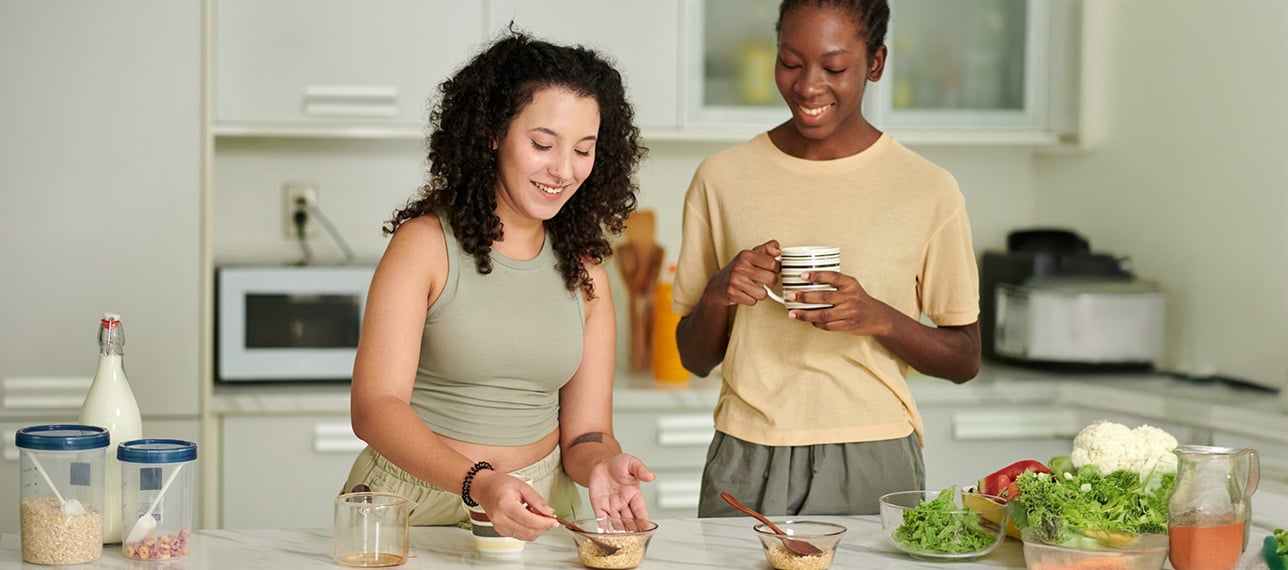Snacking is practically an institution. According to data from the International Food Information Council, 72% of Americans have at least one snack a day, and for many, it's a way to recharge between meals. However, not all snacks are created equal. These bites can either be a habit that boosts your health or one that sabotages your goals, depending on what, when, and how you do it.
Is Snacking Good or Bad for You?
The answer isn't black or white. Snacking can have benefits or risks depending on the quality of the snack and when you eat it.
Potential Benefits
- Energy and glucose stability: Eating snacks that combine protein, fiber, and healthy fats helps prevent sharp spikes and crashes in blood sugar, which keeps your energy levels stable throughout the day.
- Prevention of overeating: Having something nutritious between meals can reduce the likelihood of arriving at your next main meal with excessive hunger, helping to avoid caloric surpluses.
- Increased intake of key micronutrients: Healthy snacks (like fruits, nuts, low-fat dairy, or vegetables with hummus) contribute to a higher intake of fiber, calcium, antioxidants, and B vitamins—nutrients often lacking in the Western diet.
Risks of Poor Choices
- Negative metabolic impact: An excess of added sugars and trans fats can lead to insulin resistance, chronic inflammation, and altered blood lipids.
- Impulse eating instead of real hunger: According to a survey by the International Food Information Council, 41% of people eat until they feel satisfied, while only 24% plan the quantity they will eat. Eating while working, watching TV, or driving can cause you to lose track of how much you've consumed, leading to excess calorie intake.
- Increase in empty calories: Cookies, chips, pastries, and sugary drinks are high in energy but low in nutrients, which promotes long-term weight gain. In this regard, 14% of survey respondents turn to donuts and pastries for a morning snack, and between 17% and 29% choose cookies, cake, or ice cream for an afternoon snack.
Poor dietary choices pose several risks to health, from metabolic issues to weight gain:
- Metabolic Impact: Causes insulin resistance.
- Impulse Eating: Leads to overeating.
- Empty Calories: Promotes weight gain.

How Snacking Affects Your Energy and Metabolism
Your metabolism and energy levels react differently depending on the type of snack:
- Snacks rich in simple carbohydrates (like cookies or sugary drinks) cause rapid glucose spikes followed by sharp drops, which can leave you feeling hungrier and more tired.
- Snacks with protein and fiber (like nuts, Greek yogurt, or hummus with vegetables) release energy gradually. This helps you stay full for longer.
- Snacking every three or four hours can be beneficial for those who are physically active or have irregular meal schedules, but it is not essential for everyone.
Healthy Snack Options to Try
If you want your snacks to be a plus for your health and not an obstacle, opt for minimally processed foods rich in fiber, protein, and healthy fats:
- Protein-rich: Unsweetened Greek yogurt with berries, hard-boiled eggs, turkey and avocado roll-ups.
- High-fiber: Carrot sticks with hummus, apple with almond butter, edamame, or the TOYOU Granola Snack Bar with oats, nuts, coconut, and dried cranberries.
- Healthy fats: A mix of nuts and seeds, avocado with lime and salt, olives, or energy bars like the TOYOU Apple Pecan bar, which has a blend of pecans, almonds, and dehydrated apple.
- Quick but stable energy: Dates stuffed with peanut butter, protein smoothies with spinach, or the TOYOU Peanut Butter Cranberry bar.
Practical tips for planning healthy snacks
- Plan ahead: Dedicate one day to preparing individual portions of fruits, nuts, or hummus.
- Avoid mindless snacking: Don't eat directly from the bag; use small containers to control portion sizes.
- Combine macronutrients: Mix protein, fiber, and healthy fats to prolong satiety.
- Keep healthy options visible and accessible: Have washed and cut fruit in the refrigerator and healthy snacks on your desk or in your bag.
Snacking isn't just about curbing hunger between meals; it's about choosing foods that work in favor of your health, energy, and well-being. When your snacks combine protein, fiber, and healthy fats, they can improve concentration and reduce the risk of overeating. In contrast, ultra-processed options can sabotage your metabolism and provide empty calories.
Smart snacking is about balance. With TOYOU granolas and snack bars made from oats, nuts, and real fruit, you can keep hunger at bay while fueling your body with natural energy — no empty calories.
Source:
International Food Information Council, 2023 Food and Health Survey.